Former Finance Minister, Seth Terkper has recommended an adoption of a home-grown programme by the government to address the growing unsustainable debt dependency of the economy.
Provisional data from the mid-year budget review shows an elevated debt level of GH¢334.56 billion (US$58.04 billion), representing 77.1 percent of GDP, as at end-June 2021, up from GH¢291.6 billion (US$50.8 billion) at the end of December 2020. The government blames the effects of the coronavirus pandemic.
However, the former finance minister, speaking at the PFM Tax Africa Network’s media briefing on the fiscal review of the economy said the unsustainable debt dependency of the economy cannot entirely be attributed to COVID-19, as there are other underlying issues that need careful attention.
Government’s response to contain the pandemic and support the economy came at the cost of a record fiscal deficit of including energy and financial sector costs worsened to 15.2 percent of GDP, with a further 2.1 percent of GDP in additional spending financed through the accumulation of domestic arrears, according to the International Monetary Fund.
“The fiscal gap is not entirely due to COVID-19, as there are other underlying issues that we need to examine. It doesn’t help to continue claiming the gravity of COVID-19 and underplaying the other past stresses that the economy has gone through; otherwise, we will not be prepared. If we think that with the end of COVID-19 – the severest crisis – all other crisis that will come will be minimal, it is unlikely,” Mr. Terkper said.
“We have capped the stabilization fund, and when you cap it –unless we are continuing to put it under the COVID-19 restrictions– part of that money should be going to pay the debts under the Petroleum Revenue Management ACT 815, but that don’t seem to be that,” the former Minister observed.
He called on the government to adopt a comprehensive plan that focuses on tackling the fiscal deficit, since currently it seems impossible for the government not to borrow to meet the refinancing of debts and other expenditures – such as stimulating the economy, of which the current budget indicates there is no revenue to address. “We need to put a programme together to reverse the course of over-dependence on debt,” Mr. Terkper said.
He cited other crises in the past such as the power crisis during former President Mahama’s era as well as when crude oil prices dropped to around US$30 per barrel, which are crises similar to the COVID-19. “We should be candid with other issues of concern and not blame everything on COVID-19, so that we can collectively prepare better, which is the main concern,” he said.
Minister for Finance, Ken Ofori Atta, in delivering the mid-year budget review, noted the government’s full commitment to achieving the fiscal deficit target of 9.5 percent of gross domestic product (GDP) for this year and aiming at returning to the Fiscal Responsibility Act (FRA) thresholds, by 2024.










